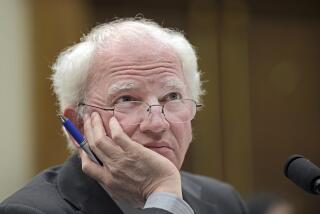Disgraced journalist Stephen Glass unlikely to ever be lawyer
- Share via
SAN FRANCISCO — A former journalist who fabricated magazine articles is unlikely ever to get a license to practice law, legal experts say.
Stephen R. Glass lost a years-long bid to become a lawyer Monday after the California Supreme Court denied him a law license in a unanimous ruling. The court faulted his character and a failure to atone for prior misconduct, saying he not only deceived readers and editors but also failed later to be completely candid about his transgressions.
Glass’ deceit was “motivated by professional ambition, betrayed a vicious, mean spirit and a complete lack of compassion for others, along with arrogance and prejudice against various ethnic groups,” the court said in an unsigned ruling. “In all these respects, his misconduct bore directly on his character in matters that are critical to the practice of law.”
Legal ethicists said the court’s decision means that Glass, who graduated from law school in 2000, is unlikely to ever get a license to practice law. Glass has worked as a law clerk and lived in Los Angeles with his girlfriend since 2004.
“I think this is the end of the line,” New York University Law professor Stephen Gillers said. “California is among the more forgiving states, and if he can’t get past the California Supreme Court, he is blocked everywhere.”
Glass, 41, was in his 20s when he fabricated more than 40 articles for the New Republic, Rolling Stone and other magazines. His stories generally disparaged his subjects, and he made up phony notes, business cards, a website and voice mails to cover his tracks.
When the extent of his deception was uncovered, a national debate about journalistic standards and practices ensued. A movie, “Shattered Glass,” chronicled his road to disgrace. Glass also wrote a novel about his misdeeds, explaining how he had hoodwinked his editors and fact-checkers and revealing his shame and suffering after he was caught.
During a 2010 California bar hearing, his current employer, law professors and psychiatrists testified that he had shown years of steadfast honesty and posed no threat to the legal profession. A bar judge and a bar review panel decided that Glass should get a license, but an admissions committee balked and asked the state’s highest court to intervene.
The court, agreeing with the bar examiners, said Glass was evasive and hypocritical even during that 2010 hearing, when he testified about his earlier efforts to win admission to the New York bar. During the New York proceedings, Glass failed to list all his fabrications and exaggerated the amount of help he gave to editors who were attempting to correct his falsehoods, the court said. Glass withdrew his name from the New York bar just as it was about to reject him on character grounds.
“Many of his efforts from the time of his exposure in 1998 until the 2010 hearing … seem to have been directed primarily at advancing his own well-being rather than returning something to the community,” the court said. “His evidence did not establish that he engaged in truly exemplary conduct over an extended period.”
Glass graduated from Georgetown University Law Center and passed the bar examinations in New York and California. He works as a law clerk at Carpenter Zuckerman & Rowley, but because he has no license, he cannot address a jury or a judge and cannot examine witnesses. He can draft motions and briefs and prepare witnesses, however.
The court said his years in therapy were admirable, but not enough. “Honesty is absolutely fundamental in the practice of law,” the ruling said.
Jon B. Eisenberg, Glass’ lawyer, said: “Mr. Glass appreciates the court’s consideration of his application and respects the court’s decision.” Glass could not be reached for comment.
More to Read
Sign up for Essential California
The most important California stories and recommendations in your inbox every morning.
You may occasionally receive promotional content from the Los Angeles Times.











